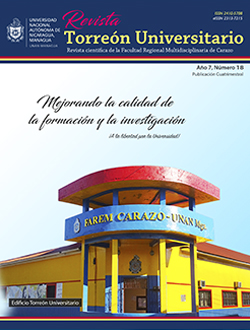Lifestyle and its relation with the nutritional status of the workers of the Instituto Politécnico de la Salud, UNAN-Managua
DOI:
https://doi.org/10.5377/torreon.v7i18.7716Keywords:
lifestyles, eating habits, nutritional statusAbstract
In order to evaluate the lifestyles and their relationship with the nutritional status of the workers of the Instituto Politécnico de Salud, POLISAL, a descriptive, correlational and analytical study was carried out. The data on the sociodemographic characteristics, nutritional status and lifestyles were analyzed, among them; eating habits, activity and physical exercise, sleep patterns and stress management and use of toxic substances, such as alcohol and tobacco. The carried out statistical analyzes were: descriptive, non-Parametric V correlation tests of Cramer. From the obtained analysis and discussion of the results, the following conclusions were reached: 86% presented overweight or some degree of obesity, a situation that is sharpened in the 96% of teachers. A food pattern composed of 10 foods: pepper, oil, onion, tomato, rice, sugar, beans, coffee, chicken and bread, with a little diverse diet, their main source of caloric intake are fats, 74% do not exercise physically, 67% have good stress management, low alcohol and tobacco consumption, there is no a significant association between lifestyles and nutritional status with a p = 0.42.
Downloads
Downloads
Published
Issue
Section
License
The authors who publish in this journal agree to the following terms.
- The author or authors of the articles, essays or research grant the National Autonomous University of Nicaragua, Managua (UNAN-Managua) the editing rights (copyright) of the submitted work, therefore the University has the exclusive right to publish the article for the entire copyright period.
- These copyrights/authors authorize Torreón Universitario Magazine and the University to edit and disseminate/publish the article in said Magazine, including printed and electronic reproduction, storage, retrieval and any other type of publication, and sources of secondary information as services. of summaries and databases, they also empower it to protect the article against unauthorized use for dissemination by printed or electronic media (PDF, HTML, EPUB, XML or others).
License for use of content
The magazine uses the Creative Commons Attribution-NonCommercial-NoDerivs 4.0 International License.
Under this statement:

This journal is licensed under a Creative Commons Attribution-NonCommercial-NoDerivatives 4.0 International License. It can be copied, distributed and transmitted publicly as long as the author and source are cited (Revista Torreón Universitario), it should not be modified or used for any commercial purpose. The full license can be found at http://creativecommons.org/licenses/by-nc-nd/4.0/.



